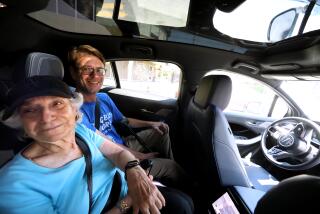List Linked Deaths, 3-Wheelers : Honda Executive Weeps at Personal-Injury Trial
- Share via
The senior managing director of the Honda Motor Co. began weeping on the witness stand Wednesday when an attorney gave him a list containing 789 names of victims--about half of them children--who have died in accidents involving all-terrain vehicles like those built by his company.
Superior Court Judge Ben Hamrick immediately called a recess to allow Tetsuo Chino time to compose himself.
Apologizes for Emotion
“I apologize for getting emotional,” Chino told the jury when the trial resumed about 15 minutes later. “As a father of a child, I get emotional.”
The Japanese executive’s breakdown occurred when he was given a computer readout of victims by San Diego attorney Craig McClellan, who pointed out that about half of the deaths were children 15 years old and younger. Chino, who is also chairman of the Gardena-based American Honda Motor Co. Inc., testified that Honda controls 65% to 70% of the ATV market in the United States.
“As I testified, the accidents and injuries associated with the ATVs is my most concern. I instructed a thorough investigation . . . but half of the injuries were under 15. We have to increase our effort to promote safety,” Chino said in halting English moments before breaking down. At times, Chino used an interpreter.
Chino’s testimony is unprecedented because it marks the first time that a top Honda official has been compelled to testify in a personal injury lawsuit involving the company’s ATVs. Previous trials featured the testimony of Honda engineers or members of the company’s research and development team. The company lost an appeal to the California Supreme Court to prevent Chino from testifying.
The executive is testifying in a personal injury trial resulting from a lawsuit filed by the parents of a 14-year-old boy who was severely injured five years ago when he fell off a Honda ATC 110 three-wheel vehicle that was being driven by an 8-year-old friend. The suit seeks unspecified damages.
Youth Suffered Brain Damage
The youth, Frank Cusimano Jr., suffered serious brain damage and currently has a vocabulary of only 40 words, said McClellan, one of two attorneys representing him.
McClellan questioned Chino relentlessly Wednesday, trying to get him to admit that he was aware of the safety hazards associated with ATVs manufactured by his company and to show that he failed to heed numerous warnings, despite mounting deaths and injuries associated with the vehicles.
Chino admitted that he had read several letters and reports sent to him by the U.S. Consumer Products Safety Commission that outlined safety problems with the ATVs. A March 21, 1984, letter from the safety commission warned Chino that rider roll-over and tip-over caused most accidents.
McClellan argued that the letter should have alerted Chino that ATVs have stability problems and should have prompted Honda to conduct further tests of the vehicle. Attorney Richard Bowman, who is representing Chino and Honda, objected to McClellan’s argument.
Hamrick said that instability itself did not suggest a defect in the vehicles but agreed that, if the safety board or other consumer groups alerted the company of possible problems, Honda had an obligation to do further testing. Chino said Honda has conducted safety tests over the last 20 years and added that company officials “haven’t found any unsafe factors.”
Engineers’ Names Sought
McClellan asked him for the names of the engineers who conducted the tests and copies of any reports made from the test results. Chino said he could not remember the engineers’ names and no reports of the tests were ever written. Instead, Chino said that he received “informal reports” of the tests.
On Dec. 4, 1984, the safety commission wrote Chino another letter telling him that the agency was going to continue investigating ATV safety and asking him for more information about the vehicles manufactured by Honda. Officials also asked Chino for figures about ATV sales in Japan and for injury data relating to ATV use there.
Chino said he instructed his staff to respond to the letter, but he testified that he never saw the reply and does not know whether one was written.
In November, 1984, one month after the safety commission conducted hearings on ATV safety, Chino wrote to Honda dealers and told them that ATV accidents were due to the “misuse of our products by our customers.” McClellan asked him whether some of the company’s customers were children, who were riding Honda ATC 110’s intended for adults.
“The ATC 110 was developed with adults as the primary target, but it did not exclude children,” Chino said.
Earlier in the day, Hamrick granted a request from Honda’s attorneys to withhold from jurors correspondence between Honda officials and the U-Haul rental company that had been introduced as evidence Tuesday.
U-Haul Put On Warnings
U-Haul purchased $5 million worth of ATVs from Honda for rental purposes. The rental company put warning stickers on the bikes that included a skull and crossbones warning riders to take proper safety measures when riding the bikes.
Honda had an agreement with U-Haul to defend the rental company in any lawsuits resulting from injuries resulting from riding the ATVs. Honda officials threatened to terminate the agreement if U-Haul did not remove the stickers.
But according to McClellan, other Honda attorneys warned the company that U-Haul’s warning stickers were more effective than Honda’s. The letters between Honda and U-Haul were included in several documents released by Honda to McClellan.






